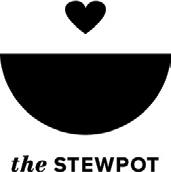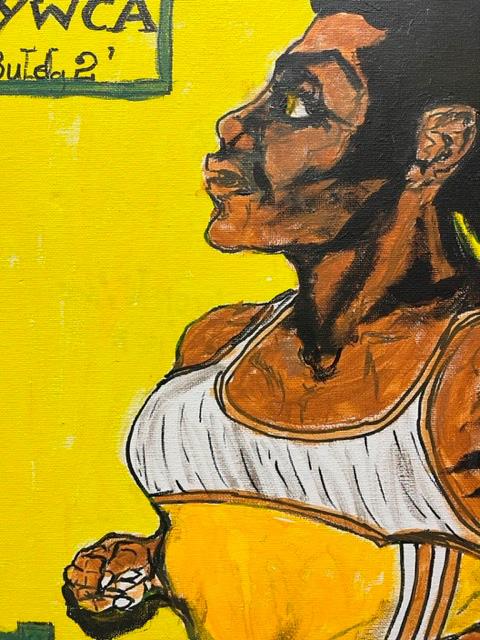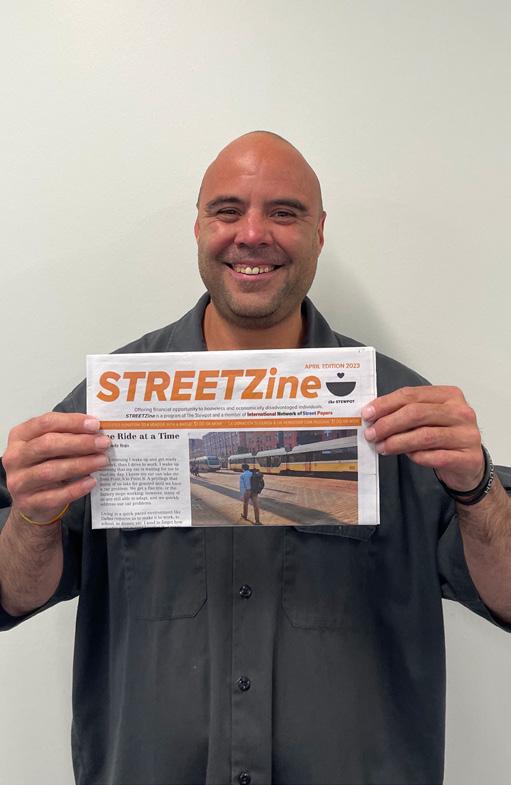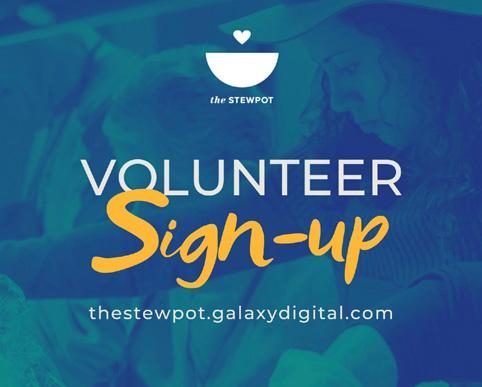Executive Director’s Report: A Day in the Life of The Stewpot
By Brenda Snitzer
The STREETZine is a monthly newspaper published by The Stewpot, a ministry of the First Presbyterian Church of Dallas. The Stewpot provides services and resources for people experiencing homelessness or who are at risk of being homeless. The organization also offers opportunities for a new life.
As part of this ministry, the STREETZine seeks to raise awareness about the issues surrounding homelessness and poverty. The monthly publication also offers financial opportunity for Stewpot clients who sell the paper to Dallas residents. Vendors are able to move towards economic self-sufficiency by using the money they receive from selling copies to purchase bus passes, food, and necessary living expenses. Clients also receive stipends for contributing articles to STREETZine.
The content in STREETZine does not necessarily reflect the views or endorsement of its publisher, editors, contributors, sponsors or advertisers. To learn more about this publication, contact Betty Heckman, Director of Enrichment, 1835 Young Street, Dallas, Texas 75201 or BettyH@thestewpot. org. To read more about STREETZine, a member of the International Network of Street Papers, go to www. thestewpot.org/streetzine.
STREETZine is published by The Stewpot of First Presbyterian Church.
Managing Editor: Wendy Rojo
Editorial Advisory Board: The Rev. Amos Disasa
Brenda Snitzer
Suzanne Erickson
Russell Coleman
Poppy Sundeen
Sarah Disasa
William McKenzie
Betty Heckman
Photo Editor: Jesse Hornbuckle
Each day at The Stewpot brings new people and new wrinkles to our work in serving people experiencing homelessness or at risk of becoming homeless. But throughout the day, the week, and the year, you will find Stewpot staff and volunteers engaged in serving others in these ways:

Finding a place to live
Dallas’ annual count of people experiencing homelessness on the street or in a shelter numbered 4,244 citizens this year. The number for 2023 was down slightly from 2022, but the challenges of getting people housed remain daunting.
That’s why each day you will find Michelle Secours, director of housing and homeless services, leading our rapid rehousing initiative. She and our eight housing case managers work with Stewpot clients in securing federally subsidized housing vouchers and locating apartments for them to rent. Many of our clients live at shelters like The Bridge Homeless Recovery Center or on the streets, so a place of their own represents a major and welcome step forward.
We are pleased to be part of Dallas’ R.E.A.L. Time Housing Initiative. As in many cities, getting qualified clients housed, and then providing wraparound services like financial or employment counseling, can keep unhoused Dallas residents from falling further into the perils of homelessness.
Working with case managers
Each day, counselors and case managers work under the leadership of Suzanne Erickson, senior director of Stewpot programs, and Tanya Northcutt, manager of homeless services, to provide services like ID cards, a mailbox, and representative payee services. (The latter service keeps any federal stipends clients may receive safe from financial predators.)
Simple tasks like getting mail is something many of us take for granted. But many of our clients do not have a street
address or a post office box. So, having a place to come retrieve mail, including any federal assistance, is a necessity. And working with case managers helps them resolve issues like lost identity cards.
Getting treated
Parkland Health and Hospital Systems operates a medical clinic Monday through Friday on the first floor of The Stewpot. Our clients receive treatment for chronic conditions like diabetes or just routine calls for illnesses like the flu. Medical providers administer care throughout the week so clients can avoid the long lines that may await them at emergency rooms.
They also can access dental services through our on-site dental clinic. Dentists associated with First Presbyterian Church launched this clinic many years ago and Parkland now runs it with their staff and dentists.
Clients likewise can secure mental health services by appointment. Metrocare Homeless and Housing Services provides case managers and doctors who work with clients in private sessions or through medication management to deal with depression, anxiety, and other mental health challenges.
Serving and growing food
Each morning, noon, and night, 365 days a year, The Stewpot provides meal services at The Bridge. Through the leadership of Michael Haynes, director of meal services, and his team, volunteers work alongside staff from The Bridge in serving breakfast, lunch, and dinner. Either now at The Bridge, or previously at our Stewpot building, or long ago in First Presbyterian’s basement, our ministry has been honored to provide meals to people experiencing homelessness since 1975.
Now, we also operate a robust food recovery program. Each day, Rob Guild, the manager of our food recovery work, coordinates the donation and collection of unused food from restaurants, groceries, and nonprofits. This food is then used to serve clients at The Bridge or through our food distribution work.
Under the leadership of Becky Zamora, manager of family distribution programs,
Continued on page 3

2 STREETZine SUMMER EDITION 2023
Continued from page 2
the food distribution work has expanded since the early days of the pandemic. Twice a month, we provide groceries to families in a drive-through delivery or to their home using Door Dash to deliver necessities to senior citizens. To make that happen, our food distribution team plans for supplies throughout the week.
We also operate a community garden on our site, where horticulturalist Sandra Zelley and longtime Stewpot volunteers Susan Stephens, Sara Harvey, and Sam Marriott work with visiting teams and others in growing fruits, vegetables, and herbs.
Bolstering an education
Each week, our children and youth program, under Manager Alma Reyes, offers activities for students from low-income households to help improve their academic performance and make positive choices. As one example, each Saturday during the school year, students in grades 1-5 participate in our Saturday Kids’ Club. Similarly, each Wednesday night Junior Crew students in grades 6-8 and Venturing Crew students in grades 9-12 meet for activities, including any necessary tutoring. And during the summer, students in grades 1-12 participate for seven weeks in our day camp.
We also offer a mentoring program for high school students so they can be
paired with an adult in an area the student would like to pursue in college or through a career. And we are pleased that five 2023 high school graduates received collegiate scholarships this year through our scholarship initiative, keeping our total number of scholarship students around 46.
Discovering a voice
Every day between 9 a.m. and 4 p.m., artists gather on the second floor of The Stewpot in our three-room art studio. In the late 1990s, Dallas artist Pamela Nelson collaborated with The Stewpot to launch a place where clients can express themselves through painting, sculpture, ceramics, and other forms of art.
Today, artists work on their own or with instructors. Christy Coltrin, who works with her husband Brad Oldham in their Dallas sculpture studio, emphasized earlier this year at Soup’s On, our annual luncheon, that the work is not just therapeutic. It’s about artists discovering their voice.
Our artists sell their paintings at organized shows and elsewhere, thanks to Betty Heckman, director of enrichment. Artists earn 90% of the sale price of each piece, while the remaining 10% goes for supplies, field trips, and other program costs.
Likewise, on Friday mornings between 10 and 11:30, Stewpot clients who want to
develop their writing voice participate in our writers’ workshop. They write essays that range from finding hope to securing housing to coping with extreme weather. Their work may appear in STREETZine, our monthly street paper where Wendy Rojo serves as managing editor, or in publications like the Dallas Morning News, the International Network of Street Paper, or the Dallas Media Collaborative. In this edition, you will find essays, caricatures, and photos from some of our participants that detail a day in their lives.
As you can tell, there are many facets to a day in the life of The Stewpot.
Our clients also participate in the Dallas Street Choir, which practices each Wednesday morning in First Presbyterian’s sanctuary. Led by founder and conductor Jonathan Palant, the choir has performed in venues from across the country and world, from England to New York City to Dallas.
As you can tell, there are many facets to a day in the life of The Stewpot. We are honored to serve our clients through each of them as they seek to move ahead in their lives.
Brenda Snitzer is executive director of The Stewpot.
DIAL 211
For help finding food or housing, child care, crisis counseling or substance abuse treatment.
ANONYMOUS AVAILABLE 24/7, 365 DAYS A YEAR
2-1-1 Texas helps Texas citizens connect with state and local health and human services programs.

SUMMER EDITION 2023 STREETZine 3
Writers’ Workshop Essays
Editor’s Note: Each Friday morning at 10 a.m., The Stewpot hosts a Writers’ Workshop. During the sessions, participants address selected topics through prose or poetry. In this edition of STREETZine, we feature the essays of writers that explore a day in their lives.
James Varas
You wake up in the morning. Where are you? What’s on your mind? What do you do? What’s for breakfast?
I wake up and my pack is in my arms. They sleep in my arms like I sleep in my Heavenly Father’s arms.
I make my way to my knees and begin to pray. It is very hard to do anything with a pack of animals because they want to do everything together. So, we pray together.
How does your morning go? And how does the rest of the day go? Who/what do you see? What do you do? What’s on your mind? Describe your surroundings.
We walk to the park, and they water the trees.
They think it is their job to protect me, but in reality I am their guardian. They are very faithful companions. I pick up their droppings like a father changes a diaper. They are like little children to me and would be lost and heartbroken without their father. I am their daddy and plan to take them on the road with me.
We eat together. We look like a pack of lions devouring a buffalo. We enjoy eating.
Once they are fed, I begin to read my Bible. Most days I sing praises to God. Everyday God is with me.
We rise together. We pray together. And we walk together. And we eat together. We even praise together.
Many times, I look back at my life and thank
God for such a wonderful life I have lived. Jesus Christ is my light in the darkness of this world.
When evening comes, where do you go? What do you do after dinner? Describe your surroundings. What are your last thoughts of the day before you go to bed?
I end my day much like I started my day: back on my knees in prayer. My Heavenly Father tucks me in. Jesus Christ and the Holy Spirit are right there with me.
I am in my Heavenly Father’s arms and my Holy Family are inseparable.
James Varas is a writer in The Stewpot’s Writers’ Workshop.


SUMMER EDITION 2023 STREETZine 5
Illustration by David Yisrael.
Photo by Jason Turner.
Mike McCall
You wake up in the morning. Where are you? What’s on your mind? What do you do? What’s for breakfast?
I wake up in my own bed in a quiet room at my own apartment. I get ready to class, grab a drink and yogurt, and head for the bus.
How does your morning go? Who/what do you see? What do you do? Where do you go? What’s on your mind? Describe your surroundings.
Monday thru Friday I get to go to classes to get educated and make myself knowledgeable in areas that I can help others. I listen to a news podcast while I use public transportation to get to my school or The Stewpot.
What’s for lunch? Where do you eat? Are you with other people?
I usually eat when I get back from class. I am relieved to be back home because my physical disabilities make travel hard and painful. I am usually hurting by the time I get back, so I am glad to get off my feet.
How does the rest of the day go? What kinds of things do you do? Where do you go? What do you see?
The rest of my day involves reading, studying, or watching TV. After being in Dallas County Jail for one-and a-half years and then The Bridge for nine months, I truly enjoy being away from the general population. Being alone in a quiet room is blissful for me.
When evening comes, where do you go? What’s for dinner? What do you do after dinner? How do you get ready for bed? Where do you sleep? Describe your surroundings. What are your last thoughts of the day before you go to bed?
I enjoy the freedom of preparing my own meals. You don’t get steak and potatoes in jail or a shelter.
I am surrounded by artwork that I like; family pictures, many of which are of people who have passed; and books. I also am surrounded by a sense of privacy that is all my own. Every night, I say the same prayer. I also am grateful for the roof over my head, the clothes on my back, and the food that I am able to receive.
Transforming from a homeless ex-con to a productive citizen with a place I can call home is quite an accomplishment. Getting those keys in your hand lifts you up and gives you something to be proud of.

Mike McCall is a writer in The Stewpot’s Writers’ Workshop.

6 STREETZine SUMMER EDITION 2023
Illustration by David Yisrael.
Photo by Darin Thomas.
Larry Jackson
You wake up in the morning. Where are you? What’s on your mind? What do you do? What’s for breakfast?
Briefly with words and the skill of an artist, I shall draw a picture from the early morning rise until the setting of the sun.
My status in homelessness brings a twist to the uncertainty of life. In this case, my faith and belief have to come center stage. The goal is to live 365 days of the year. My everyday challenge is to make this day better than yesterday.

In the homeless shelter, breakfast comes in a one-hour time capsule. Today, for example, a light breakfast is being served: boiled egg, biscuit with jelly, and milk or juice. Yes, this is a great start for the day.
How does your morning go? What do you do? Where do you go? What’s on your mind?
Now it is time to place in order my needs and things-to-do list. Obtaining public housing
is number one. Keeping a close eye on this comes first on the list. Networking with others helps me in the process. I’m not afraid to share with others. Caring and sharing can make another person’s life brighter. Remember that this is a journey that takes time and endures. Every day is never the same.
How does the rest of the day go? What kinds of things do you do? Where do you go? What do you see?
My early retirement sets a different stage in this quest. I’m able to do a little more. I can ride the train all day, walk in the park, or eat out for a change, leaving the pity party behind and moving forward in the retiree’s state of mind. Life itself will keep moving, so making the adjustment is key. Breaking down the bondage of fear will help.
When evening comes, where do you go?
On one stage in a day and a life there’s the criminal element, like drinking and drugs. Just name the party you want to be part of. Sometimes a person must play a losing hand. From his or her play they find out about
themselves—a winner or loser. Many people have found success in life. They just keep living and keep the faith. Peaches and cream are not promises, but for those that endure, better is just around the corner.
What are your last thoughts of the day before you go to bed?
Every day brings a new beginning. I look forward to life in all my days—opening my mind to learn, setting my sights on a bigger and better tomorrow, building in hope on a solid foundation that will last a lifetime. Most of all knowing that life is for living. If only I had more hours in my day. If I could pull a rabbit out of the hat, could I make life disappear and return like that? Truly then, I would be your magic man.
Hopefully, I can make all my dreams come true in a brief day and life.
Larry Jackson is a writer in The Stewpot’s Writers’ Workshop.

SUMMER EDITION 2023 STREETZine 7
Illustration by David Yisrael.
Photo courtesy of Larry Jackson.
Jason Turner
You wake up in the morning. Where are you? What’s on your mind? What do you do? What’s for breakfast?
I wake up in the morning at The Bridge shelter in downtown Dallas. Waking up is tough because I am an insomniac. I must take medicine to stay asleep. After I do wake up, I go through my hygiene routine and then prepare for breakfast in the cafeteria.

How does your morning go? Who/what do you see? What do you do? Where do you go? What’s on your mind? Describe your surroundings.
My morning goes by extremely quickly. I see my roommates, workers and people coming for health and dental care. I usually go to work, but recently a rigorous job search has slowed me down.
What’s for lunch? Where do you eat? Are you with other people?
If I am at the shelter, I will eat lunch there. The line is long and the cafeteria is always packed full. If I am not at the shelter, I fend for myself.
How does the rest of the day go? What kinds of things do you do? Where do you go? What do you see?
The rest of my day is easy. I often go to a Stewpot art class, attend a Dallas Street Choir practice on Wednesdays, and write for the STREETZine on Fridays. I also like to go to movies.
I now have an apartment voucher, so I visit places and try to get accepted.
When evening comes, where do you go? What’s for dinner? What do you do after dinner? How do you get ready for bed? Where do you sleep? Describe your surroundings. What are your last thoughts of the day before you go to bed?
Dinner is served at The Bridge from 6 p.m. until 7 p.m. The meal varies from not being
edible to extremely delicious. After that, I go to a meeting or clean my room.
The rest of my day is easy. I often go to a Stewpot art class, attend a Dallas Street Choir practice on Wednesdays, and write for the STREETZine on Fridays. I also like to go to movies.
I sleep upstairs at the shelter in a cubicle with lots of other men. Before I sleep, I go through my medicine and I assess what needs to be done tomorrow, and what time I will need to wake up.

8 STREETZine SUMMER EDITION 2023
Jason Turner is a writer in The Stewpot’s Writers’ Workshop.
Illustration by David Yisrael.
Photo by James Varas.
Darin Thomas

You wake up in the morning. Where are you? What’s on your mind? What do you do? What’s for breakfast?
I wake up at home, wash my face, brush my teeth, and get ready for work. I drink a cup of coffee for breakfast.
How does your morning go? Who/what do you see? What do you do? Where do you go? What’s on your mind? Describe your surroundings.
My morning involves getting to the bus and train, which I ride to work, The Stewpot, and appointments. Riding the bus or train every day, I am thankful that I am free. Along the way, I see birds flying, pretty houses, and cars driving by.

What’s for lunch? Where do you eat? Are you with other people?
When I am at work, I eat lunch from 2-3 p.m., often with others in the cafeteria.
Other times, I like eating at TD Barbecue. I also eat at MetroCare, where I see my counselor. I often eat there with others.
How does the rest of the day go? What kinds of things do you do? Where do you go? What do you see?
I get to work at Goodwill on Tuesday and
Wednesday at 9 a.m. and Sunday at 8 a.m., although I don’t clock in until 9. Then, my day starts. I unload and load trucks that are bringing electronics, shoes, clothes, toys, books, DVDs, and other items to Goodwill. I work with four or five others, two of whom I knew before.
On Monday and Thursday, I still attend the Intensive Outpatient Program (IOP) through MetroCare at The Bridge. I graduated from the recovery class in 2022, but I still attend sessions. They help me with my recovery from drug abuse.
People there remind me to stop using drugs and to take my recovery seriously. Jascel and Tina are my teachers and good recovery coaches. We watch videos on recovery techniques, do worksheets about recovery, and share our stories. My IOP class helps me get through my week.
After class, some of my classmates and I go out to the movies. Or I invite some of my friends to my apartment, where I cook a meal. Just being around these guys, some of whom are in the Writers’ Workshop, helps me with my recovery.
On Fridays, I go to The Stewpot and participate in the Writers’ Workshop.
On Saturdays from 8 a.m to 9 a.m., I attend my NA/AA classes in North Dallas. They help because we talk about recovery as well. My
AA sponsor is Chris. I talk to him three times a week. We have good conversations. He also takes me to all my meetings in North Dallas. Things are going well in my recovery. I thank God for my NA-AA classes and for my IOP classes.
After those meetings, Chris takes me back home and I clean the house, watch movies, and get ready for work on Sunday.
When evening comes, where do you go? What’s for dinner? What do you do after dinner? How do you get ready for bed? Where do you sleep? Describe your surroundings. What are your last thoughts of the day before you go to bed?
The trip back home from work requires two bus rides and one train ride. It takes about an hour to get home. Once I get home, I take a shower and eat dinner. I often eat chicken and mashed potatoes.
After dinner, I like to relax, watch movies, clean my apartment, and read a little. I also take my medications. It is then time to relax and get ready for work the next day.
I feel so good about my freedom. I can do what I need to do without someone telling me what to do.
This is my life now.
SUMMER EDITION 2023 STREETZine 9
Darin Thomas is a writer in The Stewpot’s Writers’ Workshop.
Illustration by David Yisrael.
Photo by Mike McCall.
Justin Stroye
You wake up in the morning. Where are you? What’s on your mind? What do you do? What’s for breakfast?
I start off my weekday mornings the same every time. I’m up at 6 a.m. before the sun to do my Guests Give Back tasks at The Bridge. I’m usually finished by 6:45 a.m. and either go back upstairs for more sleep or stay in the Welcome Building where I do my tasks to make sure my grandmother doesn’t get too upset and the guests are respecting her.
I wake up with a lot on my mind everyday. It ranges from thinking about my sister who died three years ago and whom I miss to this day to what I am going to do that day.
How does your morning go? Who/what do you see? What do you do? Where do you go? What’s on your mind? Describe your surroundings.
I live in the Transitional Shelter at The Bridge since I am on the way to getting an apartment soon. The space is on the third floor. It is okay.
My weekends are a bit different. I don’t have to be up early so I sleep until 8 or 8:30. I
either eat at the dining hall or go two blocks over to get good food that volunteers have prepared.
What’s for lunch? Where do you eat? Are you with other people?
If I don’t eat at The Bridge, I will walk over to Our Calling for lunch. At both places, I am with other people.
How does the rest of the day go? What kinds of things do you do? Where do you go? What do you see?
Sometimes I walk around to clear my mind of all the negativity in it. I admire the surroundings when I am walking: the different buildings, vehicles, and people. I think to myself that someday I am going to get a car like one of those.
If I walk around in the heat, I sometimes put on a muscle shirt and put a wet t-shirt on my head. Other times, I just stay at The Bridge to stay out of the heat.
My weekends are not too complicated. I go to my aunt’s to spend the day with my nephew and younger brother. If my brother’s not there, I go to my mom’s to see him. I would go to my
pop’s but I got banned for four months in April for messing up. Good news is those months are almost up.
When evening comes, where do you go? What’s for dinner? What do you do after dinner? How do you get ready for bed? Where do you sleep? Describe your surroundings. What are your last thoughts of the day before you go to bed?
When evening time comes around, I’m back upstairs until dinner time at 6 p.m. My friends James and Thomas and I don’t go to dinner until 6:45 to give the line time to go down. It’s our daily routine.
On Mondays at 7 p.m., I go to my life skills class with Q. On Wednesdays, I go to a social conduct class with the same guy. He’s my peer support.
I shower, then lay in bed with my computer until I fall asleep. It’s really peaceful for the most part.
I go to sleep thinking to myself, “Today was a good day.”
Justin Stroye is a writer in The Stewpot’s Writers’ Workshop.
Charles Duff
You wake up in the morning. Where are you? What’s on your mind? What do you do?
It’s morning. I am awakened by the sounds of sirens and traffic before I even open my eyes. I pray and thank God for letting me see another day. And now it begins, a new day and a new chance to obtain the one thing that I want the most: peace.
Let us define peace. Most think that peace comes with no conflict but, in all actuality, you have to work to obtain peace. People have lost their lives wanting peace. The peace I’m constantly searching for is peace of mind. It’s a change in life so tremendous that the soul, if it could be seen, would look like a battleraged field.
In the course of a day, we all need nourishment, not just physically also but mentally and spiritually. During my day, these are the things that I work for. When I open my eyes, I pray. Walking down the street alone, I pray. God is the main factor, a source needed in my everyday life.
What’s for breakfast? How does your morning go? What do you do? Where do you go? What’s on your mind?
After praying, I search for breakfast. I used to go to places like the Bridge and The Stewpot, looking for breakfast. But I’d much rather walk around on a journey to fend for myself, thinking outside the box. Sometimes I visit friends at restaurants and we have a meal together. They know my struggles.
After I eat, I’m usually in a fog all day and into the night. I wander the streets. Very seldom do I find myself smiling about things. I try day after day to find something to feel positive about. If given a chance to start all over again, I would, but you’ve got to play the cards that were dealt.
When evening comes, where do you go? Describe your surroundings. What are your last thoughts of the day before you go to bed?
When I settle in for the night, sometimes I feel insecure and I get up and leave. I find a new place. It’s hard to find peace when you think the world is after you.
There’s an old saying: It’s better to have loved and lost than never to have loved at all. I beg to differ. I loved my life when I was with my wife. I had purpose. I had a job. I had real friends.
It’s amazing that we have the most beautiful skies and the brightest sun but in my life there’s only darkness.
Charles Duff is a writer in The Stewpot’s Writers’ Workshop.
10 STREETZine SUMMER EDITION 2023







 By Vicki Gies
By Vicki Gies
















